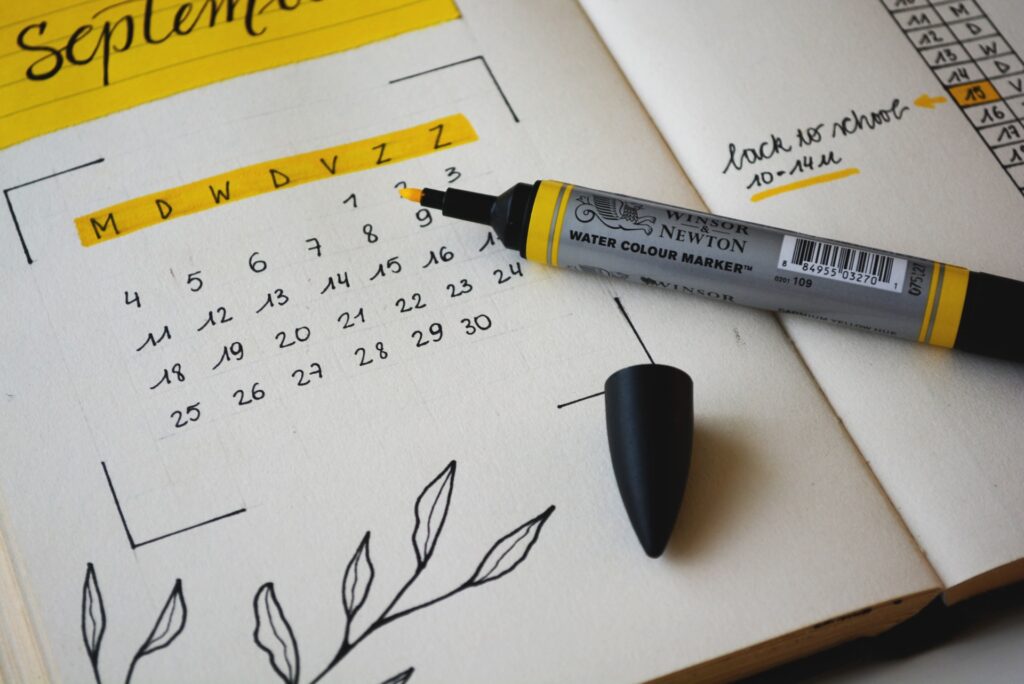Reading time: 4 minutes
Are the demands of your daily tasks leaving you overwhelmed and causing you to lose sight of your long-term goals?
Maintaining a clear overview can be quite challenging.
Not too long ago, I found myself grappling with precisely this situation, seeking a method to organize my thoughts, formulate a distinct vision for my career, and that’s when I stumbled upon Bullet Journaling. Although the method was not unfamiliar to me, I must admit that I had been too lethargic to consistently engage in journaling. Yet, after summoning the willpower to commit, I swiftly recognized its transformative benefits.
Bullet Journaling, originating from New Yorker Ryder Carroll, is more than a mere self-organization system— it’s a holistic approach to boosting attention and productivity. A fusion of a calendar, notebook, and diary, the journal’s core elements involve bullet points, aptly termed Bullets, which categorize and structure tasks, events, and thoughts through logging. The methodology allows for personalization, enabling users to craft a system tailored to their unique needs and preferences.
In an increasingly digital world, Bullet Journaling offers a refreshing alternative. The manual act of jotting down tasks, goals, and reflections not only engages memory but also stimulates cognitive processing. This proves especially beneficial for leaders or entrepreneurs looking to use journaling as a tool to organize projects, plans, and teams. But Journaling can be also beneficial for job serach.
Prerequisites for Effective Journaling
Time: Establishing dedicated times for journaling is crucial. For instance, allocating quarterly hours for the Future Log, monthly hours for the Monthly Log, weekly 30-minute sessions for the Weekly Log, and daily 15-minute intervals for the Daily Log. The method’s efficacy relies on consistent commitment, making journaling a daily habit.
Space: Create a tranquil environment conducive to concentration and focus. Limiting ambient noise to that which enhances concentration is helpful, and switching the smartphone to airplane mode aids in minimizing distractions.
A Step-by-Step Guide
Set a Key:
Use simple symbols to create a visual reference within the journal. For instance:
• For tasks
° For meetings
🎁 For birthdays
Traditionally, record the key on the first page.
Create an Index:
Designate a few pages for the index, allowing it room to expand. Chronologically log new pages in the index whenever created.
Develop a Future Log:
Utilize the Future Log as a traditional annual calendar, noting birthdays, vacations, holidays, and allocating pages for long-term goals.

Establish a Monthly Log:
Craft monthly logs at the end of the preceding month or the start of the current one. Include essential dates and tasks, forming a visual roadmap for the weeks ahead. The Weekly Log, requiring one to two pages, follows the Monthly Log.

Daily Log:
Initiate a Daily Log each morning or the evening prior, documenting professional and personal appointments, tasks, and events. New tasks arising during the day can be promptly logged, enabling timely prioritization. Regularly incorporate tasks from the Monthly Log into the Daily Log.
Regular Reflection:
Regularly reflect on tasks, assess completion status, and evaluate progress toward long-term goals.
You love journaling and reflection? Then my free workbook is perfect for you. It helps you quickly gain clarity about your career!
Bullet Journaling in Job Search
- Set and Pursue Career Goals: Document long-term career goals in the Future Log and outline interim goals in the Monthly Log. Utilize the Daily Log to plan specific steps bringing you closer to your objectives.
- Networking and Relationship Management: Leverage the Bullet Journal for planning networking activities, noting conferences and networking events in the Future Log. The Weekly Log aids in organizing conversations and follow-ups, while the journal can serve to record important contacts and their details.
- Application Process and Job Search: Record crucial dates for applications, interviews, and follow-ups in the Future Log. The Monthly Log facilitates planning activities for professional development. The Daily Log can be used to record daily tasks related to job searching and career planning.
- Self-Reflection and Further Education: Embed regular reflection into the journaling process. Analyze which skills need improvement and utilize the Future Log to establish long-term educational goals. The Monthly Log is instrumental in planning concrete steps for personal development.
Source
Kirchhof, Janine: Selbstorganisation im Hier und Jetzt. Bullet Journaling. Manager Seminare, Heft 307, Oktober 2023; S. 73 ff.